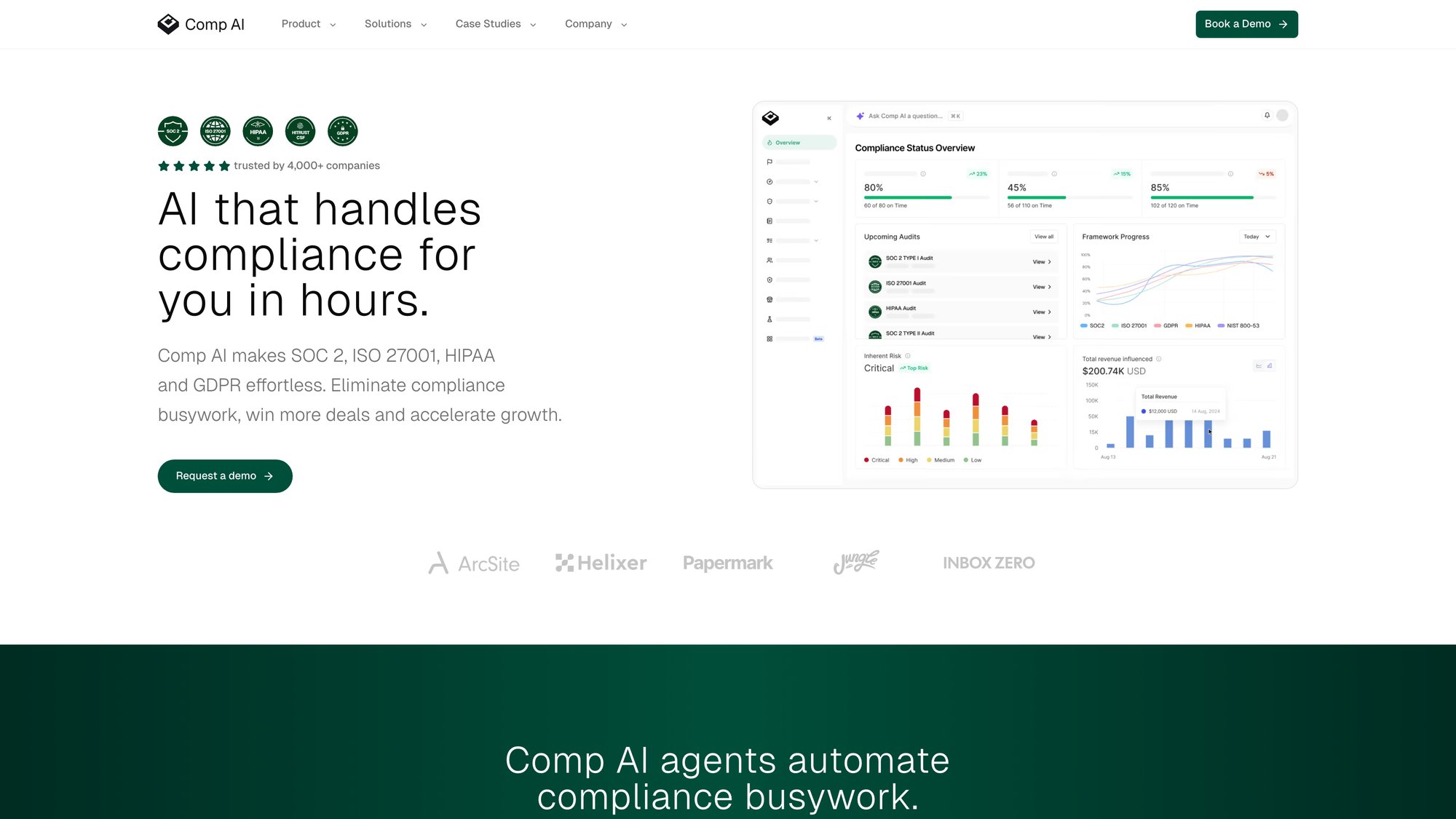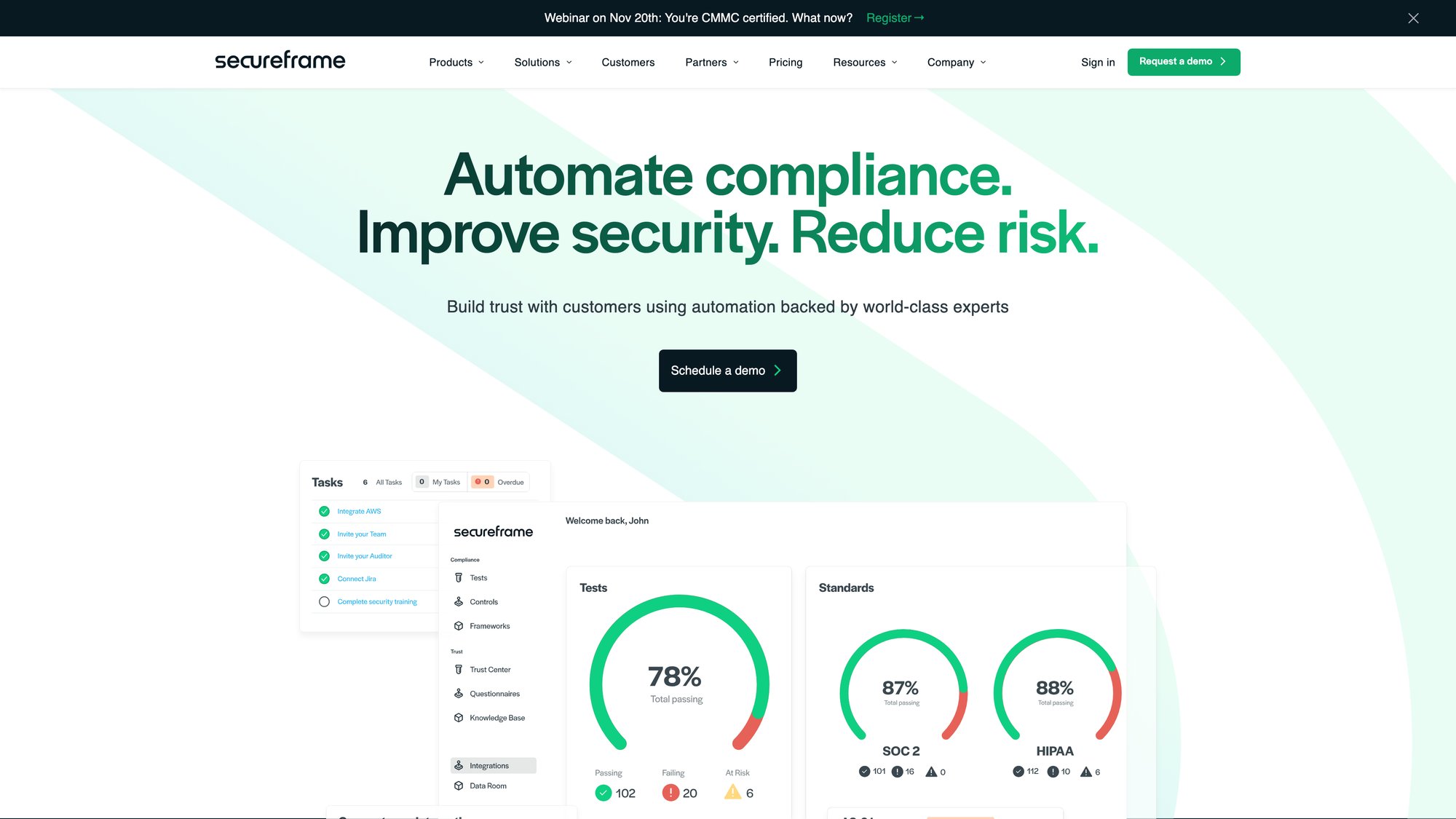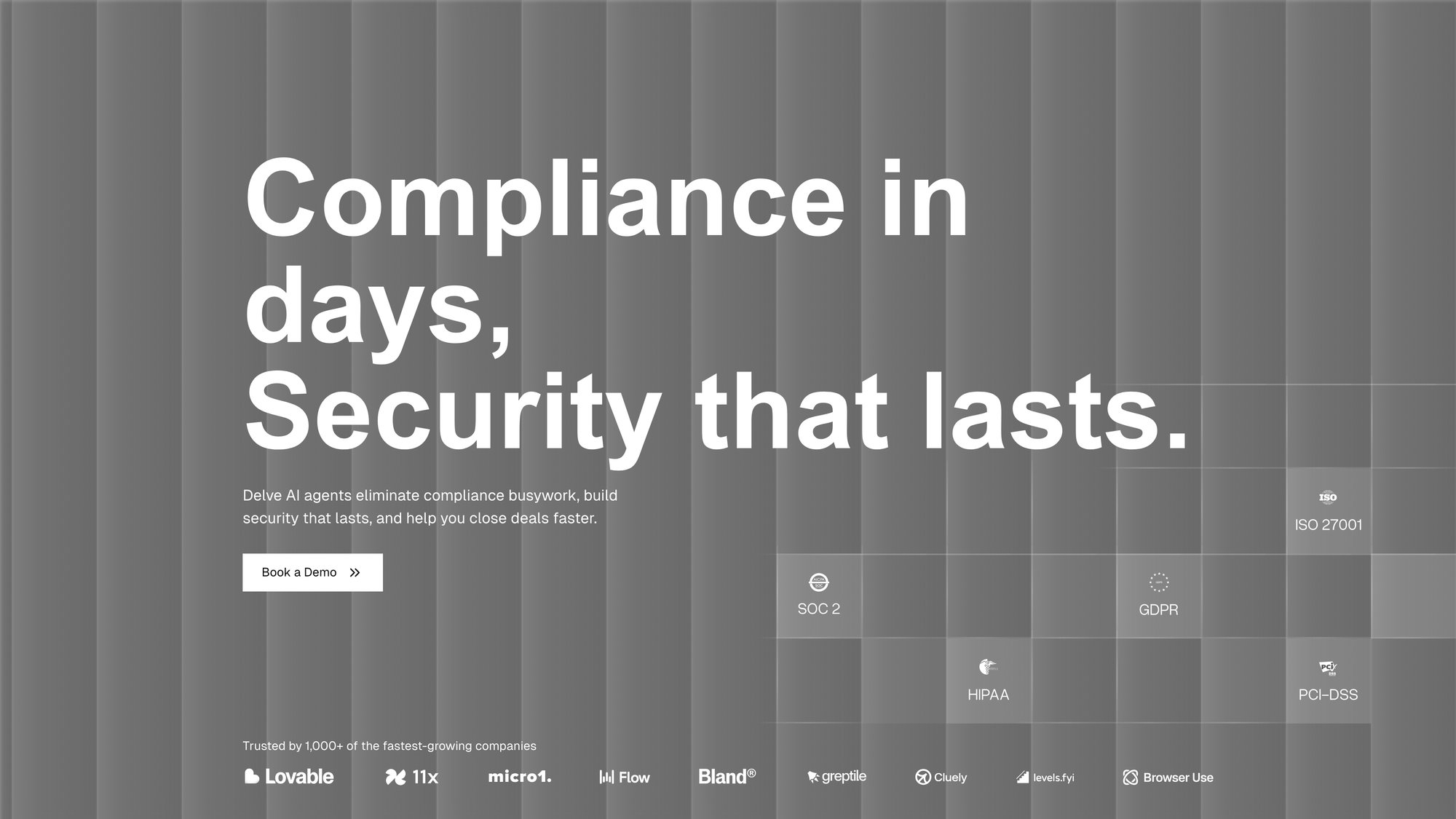If you're researching Drata alternatives, you're not alone. Drata has established itself as one of the leading compliance automation platforms, with thousands of customers and a $2B+ valuation. The platform has helped countless companies automate their path to SOC 2, ISO 27001, HIPAA, and other critical certifications by automatically collecting evidence, monitoring controls continuously, and streamlining the audit process.
Here's the reality: Drata isn't the perfect fit for everyone. Many businesses find themselves searching for alternatives due to specific pain points or evolving needs.
Why Do Companies Look for Drata Alternatives?
Understanding why teams look beyond Drata helps clarify what matters most in a compliance platform. Here are the most common reasons:
Does Drata Have Hidden Pricing Costs?
One of the biggest frustrations with Drata is pricing transparency (or rather, the lack of it). Drata doesn't publish pricing on their website, and what initially seems like a straightforward platform often comes with unexpected add-on costs.
Hidden costs that surprise customers:
- Essential features like the Trust Center can add $8K to $15K annually to your base subscription
- Critical modules like "Trust Vault" and auditor access are locked behind higher-tier plans
- Base package may lack assumed functionality, forcing separate payments for risk management and trust portals
- Sometimes even the audit itself requires additional fees

This modular pricing approach can feel like getting nickel-and-dimed for features that should be standard.
What Custom Framework Support Does Drata Offer?
While Drata supports approximately 17 frameworks out-of-the-box, things get expensive quickly if you need custom frameworks or less common standards.
→ Custom frameworks require enterprise plan upgrades
→ Less common standards trigger higher-tier pricing
→ Dealbreaker for companies with unique compliance needs
Also, some users note that Drata's control library focuses primarily on required checks for standard frameworks (around 80 controls) but doesn't cover broader cloud security best practices. If you're looking for comprehensive security posture management alongside compliance, Drata's coverage may feel narrow.
How Much Support Does Drata Provide During Audits?
Drata's model is largely self-service. While they'll connect you with a third-party auditor when you're ready, they don't deeply engage in the audit process itself. The platform provides policy templates (around 20) but doesn't help customize them to your specific business context.
For teams new to compliance, this hands-off approach can be challenging. There's minimal hand-holding on tasks like remediation or policy reviews. Many companies prefer alternatives that offer more "white-glove" support: live experts who can review your work or even handle portions of the compliance prep for you.
Other Considerations
Depending on your specific priorities, you might need:
- More robust employee security training (Drata's training modules are one-size-fits-all)
- A more flexible risk register (Drata's risk tool is fairly rigid)
- Better integration with privacy compliance (GDPR, CCPA, etc.)
- Enhanced vendor risk management capabilities
The bottom line: no single tool is one-size-fits-all. Drata is developer-friendly and automation-focused, but you might need a different mix of features, better support, or a more transparent price point.
The good news? The security compliance automation market in 2025 is filled with powerful alternatives. Some are established players; others are bringing fresh, AI-driven approaches that are changing how companies think about compliance. Below, we'll break down 10 of the top Drata alternatives, including key differences, pros and cons, and who they're best for.
1. Comp AI: The Fastest Path to Compliance
Let's talk about Comp AI: our platform. We built Comp AI because we saw a critical gap in the market: companies desperately needed compliance, but existing solutions were either too slow, too expensive, or too hands-off.
Comp AI is an open-core, AI-powered compliance automation platform designed to get companies audit-ready in hours, not months. We support SOC 2, HIPAA, ISO 27001, GDPR, and more, with over 4,000 companies trusting our platform.
What Makes Comp AI Different
Lightning-Fast Compliance Prep:
| Framework | Comp AI Timeline | Traditional Timeline |
|---|---|---|
| SOC 2 Type I | 24 hours | 3-6 months |
| SOC 2 Type II | 14 days | 6-12 months |
| HIPAA | 7 days | 4-6 months |
| ISO 27001 | 14 days | 6-12 months |
These aren't aspirational goals: they're averages based on actual customer results.

How do we do this? As soon as you onboard, our AI agents begin collecting 100% of required evidence, generating policies, and populating audit documents automatically. Meanwhile, a dedicated compliance specialist on our team helps implement any quick fixes needed in your environment.
💬 CUSTOMER SUCCESS STORY - "With Vanta we were only ~30% done after 4 months. After switching to Comp AI, we got audit-ready in a couple of days." — CTO, Persona AI
If you have an investor or big customer demanding a cert ASAP, Comp AI is designed exactly for that scenario.
100+ No-Code Integrations: Comp AI integrates with all the common tools (AWS, GitHub, Okta, Google Workspace, Azure, Jira, etc.) and uses AI agents to automatically gather evidence.
What's unique is the breadth and depth of automation: not only pulling raw data, but also taking screenshots where needed, formatting evidence to auditor expectations, and cross-checking configurations. We claim a "100% automation rate", meaning every typical evidence-gathering task can be handled by our AI agents.
100% Done-For-You Service: Comp AI couples its software with a white-glove service promise: "100% Done For You" compliance setup.

Our team will handle:
- Configure all integrations for you
- Customize all your policies (with AI drafting and human polish)
- Create your asset inventory
- Onboard your employees into security training
- Set up a dedicated Slack channel with 5-minute response times for any questions
This level of service is usually only seen with pricey consultants, but we include it in the subscription. The goal is that you spend minimal time (basically just initial approvals and final sign-offs) while we and our AI do everything in the background.
Real-Time Trust Center (Free): Comp AI provides a free, public Trust Center to all customers. This hosted portal showcases your compliance achievements and has an AI Q&A feature where potential clients can ask security questions and get instant answers.
Unlike Drata (SafeBase) which charges extra, Comp AI includes the trust portal at no additional cost.
100% MONEY-BACK GUARANTEE: We connect you with experienced auditors who already know the Comp AI platform. Because we're confident in getting you certified, we offer a 100% money-back guarantee: if you don't achieve compliance or are unsatisfied, we refund you.
This guarantee and commitment to success are things you won't typically see with other platforms.
Pricing That Makes Sense
| Comp AI | Typical Alternatives |
|---|---|
| Starting at $3,000 | Starting at $7,000-$10,000 |
| Month-to-month options | Annual contracts required |
| No hidden fees | Add-ons for trust center, extra frameworks |
| Average $8K for SOC 2 | Average $12K-$20K for SOC 2 |
| 30-50% cheaper | Industry standard pricing |
Our philosophy is no hidden fees: the price you pay includes everything (integrations, support, trust center, and even the first audit in many cases).
By leveraging our open-source core and automation, we keep costs low. And because it's month-to-month, you're not tied into a long contract.

Why Choose Comp AI?
Comp AI is the ideal solution if you need speed, automation, and affordability. We're particularly loved by startups in a hurry.
Another unique aspect is our open-core approach: the core technology is open source (on GitHub), providing transparency. Developers can see how evidence is collected, even self-host if they want (though our managed cloud is the main offering). This is unique in a field where most solutions are fully proprietary black boxes.
Key Differentiators vs. Drata:
- More hands-on: We do more of the work for you, whereas Drata expects you to drive the process
- No add-on fees: What you see is what you get (no $8K-$15K Trust Center surcharge)
- Flexible contracts: Month-to-month vs. rigid annual lock-ins
- Full concierge service: Included white-glove support, not just software
As a newer company (founded 2024), we're rapidly evolving, but we're laser-focused on customer success (reflected in a 100% audit success rate so far). If your priority is to get compliant as fast as humanly (or AI-ly) possible, with minimal effort and cost, Comp AI was built for exactly that.
Ready to get started? Book a demo with us today or sign up to see how fast compliance can be.
2. Vanta
Vanta is often mentioned in the same breath as Drata. In fact, Drata vs. Vanta is one of the most common comparisons companies make when choosing a compliance platform. Vanta launched in 2018 and now serves over 8,000 customers, focusing on real-time security monitoring and easy onboarding for startups.
Like Drata, Vanta connects to your tech stack (AWS, GCP, Azure, GitHub, Okta, etc.) to automatically collect evidence and check your security controls continuously. It supports more than 35 frameworks: one of the broadest ranges in the market, including SOC 2, ISO, privacy laws, and newer standards.
Key Features
Continuous Monitoring: Vanta runs 1,200+ automated checks hourly on your systems. If someone on your team violates a control (like turning off MFA or deploying an unencrypted database), Vanta catches it quickly. This real-time visibility helps avoid surprises right before an audit.
AI Assistance: In 2024, Vanta introduced "Vanta AI," leveraging generative AI to draft security policies and auto-answer security questionnaires. For example, Vanta's AI can suggest edits to your access control policy or fill common answers in customer questionnaires by referencing your compliance data.
Trust Center: Vanta offers a built-in Trust Center to publicly showcase your compliance status. This web page lets you share your SOC 2 report, certifications, policies, and even answer questions from potential customers using AI. Note that Vanta's Trust Center is included only in certain plans (Plus and higher), whereas Drata's equivalent (SafeBase) costs extra.
Broad Framework Support: If you plan to pursue multiple standards (SOC 2 plus ISO 27001 plus GDPR, etc.), Vanta is strong. It covers 35+ frameworks out-of-the-box with unified control mapping and automated gap assessments to handle multi-compliance in one dashboard.
Pricing
| Plan Type | Typical Cost | What's Included |
|---|---|---|
| Small Company Core | $7,500-$10,000/year | Basic framework support |
| Larger Organizations | $15,000-$30,000/year | Multiple frameworks, advanced features |
Note: Vanta's pricing is custom-quoted and not publicly listed
Who It's For
If you're a startup that wants a slightly more user-friendly, guided experience, Vanta is often praised for its ease of use and helpful support. Some say Drata is more developer-centric while Vanta is more startup-centric, geared towards quick onboarding for teams without dedicated compliance personnel. Vanta's broader framework library is a plus if you need something beyond what Drata's base offers.
3. Secureframe
Secureframe is another popular compliance automation platform competing directly with Drata and Vanta. Founded in 2020, Secureframe quickly gained traction for its guided approach to SOC 2 and ISO 27001. It integrates with cloud services and DevOps tools to auto-collect evidence and continuously monitor your security posture, supporting a range of standards including SOC 2, ISO 27001, HIPAA, PCI DSS, GDPR, and even FedRAMP.
Key Features
Workflow Guidance: Secureframe is known for its intuitive checklist-style workflow:
→ Setup provides guided list of tasks for each framework
→ Clear action items like "Enable SSO for GitHub"
→ Step-by-step execution of standards
→ Users describe it as "compliance that feels like a guided flow"

Policy Builder: Secureframe includes a library of pre-built policy templates and a policy builder UI. Unlike some vendors that just give you a Word doc, Secureframe lets you customize policies in-app and tracks versions.
In-House Compliance Experts: A differentiator for Secureframe is access to compliance experts and former auditors on staff. They provide support during your prep and even review your evidence before the audit.
Automation & Integrations: Secureframe offers 100+ integrations for evidence collection, comparable to Drata. It also has real-time alerts for issues and a trust portal feature. It performs daily checks on your infrastructure and can alert you about things like unencrypted AWS S3 buckets or out-of-date employee training.
Pricing
Secureframe doesn't publicly post prices. Companies with ~50 employees have reported quotes in the $15K to $30K per year range including one framework and audit assistance. Secureframe often bundles the first audit in the pricing through partner CPA firms.
Who It's For
Secureframe is a strong Drata alternative if you value high-touch support and a clear process. It's often praised for making compliance "not scary" for founders. But some users have reported minor bugs in syncing data: nothing critical, but occasional hiccups that require retrying an integration.
4. Sprinto
Sprinto is a newer compliance automation platform (founded in 2020) that has carved out a niche especially among cloud-native startups looking for a more "low-touch" solution. Sprinto emphasizes that it can get companies audit-ready with minimal effort, offering "pre-approved" compliance programs that launch with a few clicks.
Key Features
Adaptive Automation: Sprinto goes beyond just listing tasks: it actively organizes and nudges your team to complete them. Sprinto's dashboard might automatically remind your DevOps engineer to install a logging agent on a server if it's missing, or prompt HR to upload an employee NDA.
SPRINTO'S MDM ADVANTAGE: Notably, Sprinto includes an integrated mobile device management solution called "Dr. Sprinto" to enforce security on laptops and devices. This is handy for meeting requirements like disk encryption and screen lock policies without needing a separate MDM service.
Multiple Business Units (Zones): Sprinto has a feature called "Zones" allowing you to manage multiple products or entities under one account.
Human Support: Sprinto provides a dedicated compliance manager to each customer who assists with onboarding, advises on controls, and helps prep for audit.
Pricing
Sprinto's pricing is quote-based, but reports suggest plans start around $4,000 to $5,000 on the low end for a basic SOC 2 Type I for very small startups. One con noted is that reporting tools are not included in the lowest plan.
Who It's For
If you're a tech startup with limited in-house security or compliance expertise, Sprinto's extremely hands-off approach is attractive. The built-in device security checks (MDM) are a plus if you don't already use one. On the downside, Sprinto is a younger company and might not have as many integrations as Drata/Vanta yet, and if you need advanced GRC features, Sprinto's focus is narrower.
5. Thoropass (Laika)
Thoropass (formerly known as Laika) blends compliance software with auditor services. Launched in 2019 and rebranded to Thoropass in 2023, its pitch is to reduce the burden of both preparing for audits and undergoing the audit itself. Thoropass provides automation similar to Drata but also has an in-house network of auditors and experts.
Key Features
ALL-IN-ONE ADVANTAGE: Thoropass can serve as your actual audit partner, not just a prep tool. When you use Thoropass, they don't just toss you a list of auditors: they actively facilitate the audit.
Continuous Control Monitoring: Like others, Thoropass continuously checks your systems for compliance, supporting frameworks like SOC 2, ISO 27001, HIPAA, GDPR, CCPA, and others. It uses AI-based evidence verification to double-check collected evidence for completeness.
Risk Management: Thoropass includes a risk management module to track risks and treatments, which ties into your compliance controls.
Dashboard & Readiness Scores: The platform provides a readiness score for each framework, showing how close you are to being audit-ready (e.g., 85% SOC 2 ready).
Pricing
While exact pricing isn't public, startups have mentioned packages roughly in the ~$10K to $20K/year range for a SOC 2 Type I including an audit. Since Thoropass can bundle auditor fees, the quote might seem higher than a software-only platform, but it's more comprehensive.
Who It's For
Companies that opt for Thoropass generally want a more concierge-style experience. It appeals to teams who want a partner to get them certified, not just software. But if you already have a preferred auditor, you may not need that level of service.
6. Strike Graph
Strike Graph is a SOC 2 and security compliance platform that differentiates itself with a risk-driven approach and developer-friendly tools. It's a Y Combinator startup (W20) that started by focusing on simplifying SOC 2 for startups.
Key Features
Risk-Based Framework: Unlike a one-size-fits-all checklist, Strike Graph begins by helping you perform a risk assessment of your business and then generate a customized set of controls. This ensures you're implementing controls that make sense for your context.
AI Security Assistant: Strike Graph has an AI feature that can auto-answer security questionnaires from customers. They also have "Verify AI," which can test your compliance setup against your own goals.
Dashboard & Integrations: Strike Graph integrates with common dev tools and cloud providers to collect evidence. The interface includes interactive dashboards that give real-time status of controls. Strike Graph can also track your software components via an SBOM Manager.
Free Plan Option: Uniquely, Strike Graph offers a free tier ("Launch" plan). The free plan provides access to basic policy templates, a lightweight risk assessment, and a couple of integrations.
Pricing
| Plan | Annual Cost | What's Included |
|---|---|---|
| Launch | Free | Basic policies, risk assessment, limited integrations |
| Certify | $9,000/year | One major framework, AI questionnaire assistant |
| Scale | $18,000/year | Multiple frameworks, advanced features |
Who It's For
If you appreciate customization and a security-first mindset rather than just compliance-for-compliance's-sake, Strike Graph is appealing. Tech startups with savvy CTOs sometimes prefer Strike Graph because it feels more like a tool for engineers. But its customer base is smaller than giants like Drata/Vanta.
7. Hyperproof
Hyperproof goes beyond just IT audits like SOC 2: it's a full GRC (Governance, Risk, and Compliance) management solution. While Drata and similar tools were built for rapid SOC 2 for startups, Hyperproof was built with the vision of helping companies manage multiple compliance programs and risks continuously.
Key Features
Unified Compliance Dashboard: Hyperproof provides a real-time dashboard that shows the health of all your compliance programs at a glance.
Control Mapping & Reuse: A big strength is Hyperproof's ability to map one control to many frameworks easily:
- Your access control policy satisfies SOC 2 requirements
- Same policy addresses ISO 27001 clauses
- Also meets PCI DSS requirements
- Map once, satisfy multiple frameworks
Evidence Lifecycle Automation: Hyperproof helps track evidence lifecycle: it can version control documents, remind you when evidence needs an update, and let you reuse evidence across audits.
Built-in Collaboration: The platform has strong task assignment and collaboration features with integrations to Slack or Teams for notifications.
Risk and Vendor Management: Beyond compliance checklists, Hyperproof includes modules for risk register and third-party risk management.
Pricing
Hyperproof doesn't publish prices. Typically, Hyperproof may be priced per user or per "compliance program." For a smaller company using it for one standard, it might be in line with Drata (~$10K/year), but for larger or multiple frameworks, it could be significantly more.
Who It's For
If your organization is moving beyond just getting certified and into sustaining and scaling compliance, Hyperproof is an excellent choice. It's less about quick checkbox wins and more about operationalizing compliance. But if you're a small startup with one or two compliance needs, Hyperproof might be too feature-rich or pricey.
8. Scrut Automation
Scrut Automation is an emerging platform (founded in 2021) positioning itself as an "Intelligent GRC" solution for startups and mid-market companies. Scrut combines compliance automation with a heavy focus on risk management and cloud security. It covers 40+ frameworks, including new ones like the NIST AI Risk Management Framework.
Key Features
TRANSPARENT PRICING ADVANTAGE: One of Scrut's selling points is transparent, single-point pricing: every feature is included in your subscription, which contrasts with Drata's modular add-on approach. Trust Center, risk module, vendor risk assessments: all included with no hidden fees.
Risk-Driven Approach: Scrut provides a built-in Unified Control Framework (UCF) that maps controls across multiple standards, and it has a flexible risk register. It supports creating custom frameworks too.
Cloud Security Checks: Scrut emphasizes cloud security posture, performing automated checks against 200+ cloud security controls (benchmarked to CIS standards) across AWS/Azure/GCP infrastructure. Drata monitors certain controls but not to this deep technical extent.
Integrated Trust & Policy Management: Scrut has a Trust Vault/Trust Portal feature and boasts 45+ pre-built policy templates with help to customize them.
AI "Kai" for Questionnaires: Scrut introduced "Kai" AI to handle security questionnaires from clients.
Pricing
Scrut doesn't publish fixed prices. They emphasize that pricing covers everything with no per-module fees. Some sources suggest Scrut's typical SOC 2 package (including audit) might be around $12K for a small company.
Who It's For
Scrut Automation is a great Drata alternative if you're looking for a more holistic security compliance platform rather than just an audit checklist. Startups that choose Scrut like that they can handle multiple frameworks easily and simultaneously improve their cloud security. But a few reviews mention occasional minor bugs or integration issues.
9. Scytale
Scytale (pronounced sky-tell) is a compliance automation company that aims to streamline audit readiness for standards like SOC 2, ISO 27001, and HIPAA. Based in Israel and acquired by Endpoint (an enterprise security firm) in late 2023, Scytale differentiates itself with a very hands-on customer support model.
Key Features
Dedicated Compliance Team Support: Scytale provides dedicated onboarding and support for every customer:
→ Compliance specialists assigned to guide you step-by-step
→ Help perform gap analysis
→ Develop remediation plans
→ Assist in drafting policies and setting up controls
Real-Time Gap Analysis: The platform includes real-time dashboards that show your current compliance posture and highlight gaps before they become audit blockers.
Automated Evidence & Control Management: Scytale has all the standard automation: integrations to pull evidence, policy templates, and alerts for control changes.
On-Demand Testing: An interesting feature is on-demand compliance testing, meaning you can run an internal check at any time to see if everything is in order.
Pricing
Scytale's pricing is not public. From user comments, Scytale appears to price similarly to other top solutions. A startup might pay around $12K-$18K for a year including one audit. Scytale's offering of compliance experts included can save you consultancy costs.
Who It's For
If you know your team will need a lot of guidance and you want a very supportive partner, Scytale is a top choice. Companies that don't have a dedicated compliance officer often worry about interpreting requirements: Scytale essentially walks you through those. Customers frequently mention excellent support and responsiveness.
10. Delve
Delve is one of the hottest new platforms in the compliance automation space, often mentioned as a next-generation alternative to Drata. Founded in 2023 by MIT dropouts, Delve is an AI-native compliance platform promising "Compliance in days, not months". It gained rapid popularity among tech startups and announced 500+ customers and a $32M Series A round in 2025.
Key Features
Agentic AI Automation: Delve uses autonomous AI agents that run 24/7 to handle tasks like evidence collection, cloud configuration scanning, code analysis, and answering security questionnaires. Delve's agents proactively seek out compliance evidence and flag anything non-compliant.
Super Fast Onboarding & Setup: Delve is known for extremely fast implementation:
SPEED ACHIEVEMENT: Cases of companies getting audit-ready for SOC 2 in under 2 weeks (sometimes even 7 days for Type I). One notable success story mentions unlocking a $500K deal by getting SOC 2 ready in one week.
Slack-Based Expert Support: Though AI does the heavy lifting, Delve provides white-glove support via Slack. Customers get a private Slack channel with Delve's compliance experts.
Continuous Compliance & Security Monitoring: Delve doesn't stop at getting you compliant; its agents keep monitoring your environment for drift.
Focus on Frameworks + New Domains: Delve supports the usual SOC 2, ISO 27001, HIPAA, GDPR, PCI DSS, and also works on emerging areas like AI Risk frameworks.

Pricing
Delve does not publicly list pricing. Based on reviews, plans typically start around $10,000 to $15,000 per year for a full SOC 2 program.
Who It's For
Speed and automation are the top reasons to consider this platform. But be aware that AI isn't magic: you still need to do certain tasks.
How to Choose the Right Drata Alternative for Your Business
As you can see, there are many alternatives to Drata, each with its own strengths. To make the best choice for your organization, consider these factors:

How Quickly Do You Need to Get Compliant?
If you have a tight deadline (e.g., a deal waiting on compliance), look at platforms known for speed.
Timeline progression:
→ Traditional approach: 4-6 months of prep
→ Standard platforms (Drata/Vanta): 2-4 months
→ AI-driven platforms (Comp AI, Delve): Days to weeks
→ Comp AI specialization: Audit-ready in 24 hours (Type I)
Comp AI specializes in rapid readiness, getting companies audit-ready in days rather than months.
What's Your Compliance Automation Budget?
All these solutions range widely in price. Drata and its peers often start around $7K to $10K for small companies.
| Price Consideration | What to Look For |
|---|---|
| Base subscription | Starting at $3K-$10K depending on platform |
| Add-on costs | Trust center, extra frameworks, audit fees |
| Contract terms | Annual lock-in vs. month-to-month flexibility |
| Hidden fees | Per-user, per-framework, per-module charges |
| Total cost | Including audit fees for apples-to-apples comparison |
aims to be more budget-friendly, starting at ~$3K. Also factor in add-on costs: Do you need to pay extra for a trust center, additional frameworks, or the audit itself? no-hidden-fee model is appealing if you hate nickel-and-dime pricing.
How Much Compliance Support Does Your Team Need?
Be honest about your team's knowledge. If you have security/compliance expertise in-house, you might prefer a platform that lets you self-serve. If you have no clue where to start, lean toward those known for hand-holding.
Self-assessment checklist:
- Do we have in-house compliance expertise?
- Can our team interpret framework requirements independently?
- Do we need policy customization help?
- Would we benefit from Slack-based real-time support?
- Do we want someone to handle the heavy lifting for us?
Comp AI's Slack concierge with 5-minute response times is an example of high-touch support. The difference can be hours of your time saved and stress reduced. Reading customer reviews or case studies can give insight into how supportive each vendor is.
Which Compliance Frameworks Do You Need Now and Later?
List out what compliance obligations you have now and in the next 1-2 years:
Framework planning questions:
- What do we need today? (SOC 2, ISO 27001, HIPAA, etc.)
- What might we need in 12-24 months?
- Do we operate in multiple regions with different requirements?
- Are we in a regulated industry requiring specialized frameworks?
If it's just SOC 2 today, but you foresee needing ISO 27001 or HIPAA soon, choose a tool that can grow with you. Comp AI supports 25+ frameworks, making it a strong option for companies with evolving compliance needs.
Does Your Tech Stack Integrate With the Platform?
All alternatives integrate with common cloud and SaaS apps, but if you have a unique tech stack, ensure the one you pick covers it.
Key technology considerations:
- Integration breadth: Does it connect to your specific tools?
- AI capabilities: Auto-policy generation, questionnaire answering, evidence automation
- Monitoring depth: Hourly checks vs. daily checks vs. continuous monitoring
- Developer-friendly: APIs, webhooks, custom integrations
Also, think about whether you prefer an AI-heavy solution or are fine without the latest AI. AI can save time (auto-writing policies, answering questionnaires), but some teams are cautious and want more manual control. Comp AI is the most AI-centric, with AI agents handling 100% of evidence collection.
How Do You Verify Compliance Platform Claims?
Trust indicators to evaluate:
- Independent customer reviews on G2, Capterra, etc.
- Case studies relevant to your industry and company size
- Audit success rate claims (backed by guarantees)
- Transparent evidence collection methods
- Auditor recognition and preference
Finally, when choosing an alternative, look at independent reviews and results. Ask each vendor for customer references or search for case studies relevant to your industry. For example, if you're a 10-person SaaS startup, a platform that helped similar startups get compliant fast will boost your confidence.
The stakes are high (compliance can affect major deals), so a reliable partner is key.
Finding Your Perfect Drata Alternative
The best Drata alternative is the one that fits your company's size, culture, timeline, and goals. You have a rich selection: from established players to cutting-edge AI solutions like Comp AI. All of them aim to simplify the journey to compliance in one way or another.
By evaluating the factors above, you'll be well on your way to picking the perfect platform that not only checks the boxes for audits but also adds value by strengthening your security posture and saving your team time.
Whichever route you go, compliance automation is a worthwhile investment: it turns a formerly painful, months-long project into a much more manageable process. And with the right choice, you might get that coveted compliance report in hand faster than you thought possible.
At Comp AI, we're committed to making compliance the easiest thing you do this quarter. Our AI does the heavy lifting, our team guides you every step of the way, and our transparent pricing means no surprises. We're so confident in our approach that we back it with a 100% money-back guarantee.
Schedule a demo today and see why thousands of companies trust Comp AI to handle their compliance needs, so they can focus on what they do best: building great products and growing their business.
Frequently Asked Questions
What is the cheapest Drata alternative?
Comp AI offers the most affordable entry point, with plans starting at $3,000 for small companies. We provide month-to-month flexibility with no annual lock-in, and our all-inclusive pricing means no hidden fees for essential features like trust centers or integrations.
On average, companies pay around $8K for a complete SOC 2 program with Comp AI, which is often 30-50% cheaper than alternatives like Drata, Vanta, or similar platforms.
How long does it take to get SOC 2 compliant?
The timeline varies significantly depending on which platform you use:
| Approach | Timeline |
|---|---|
| Traditional manual | 4-6 months |
| Automation platforms (Drata/Vanta) | 2-4 months |
| Comp AI SOC 2 Type I | 24 hours |
| Comp AI SOC 2 Type II | 14 days (+ 3-month observation) |
The Type II still requires a 3-month observation period for the audit, but all your prep work is done at the start, so you're just waiting out the clock while our AI monitors everything.
Do I need a compliance platform, or can I do it manually?
You can technically pursue compliance manually using templates, spreadsheets, and consultants. But this approach typically:
- Takes 400-600 hours of work
- Costs $20K-$50K in consultant fees (not including the audit itself)
- Requires continuous manual monitoring to maintain compliance
Most companies find that compliance automation platforms save enormous amounts of time and reduce costs significantly. With a platform like Comp AI, you get both the software and the expertise for a fraction of manual costs, plus you maintain compliance continuously rather than scrambling before each audit.
What's the difference between AI-driven compliance platforms and traditional ones?
Traditional compliance platforms (like earlier versions of Drata or Vanta):
- Focus on integration and automation of evidence collection
- Connect to your systems and pull data on a schedule
- Provide basic monitoring and alerts
- Give you better tools to work with
AI-driven platforms (like Comp AI):
- Proactively seek out evidence 24/7 (not just scheduled pulls)
- Analyze your infrastructure for gaps automatically
- Automatically generate customized policies based on your setup
- Answer security questionnaires intelligently using NLP
- Suggest specific fixes for compliance issues with exact commands
Think of traditional platforms as giving you better tools, while AI-driven platforms give you an intelligent assistant that does most of the work for you.
Can I switch from Drata to another platform mid-compliance?
Yes, you can switch platforms, though timing matters:
Best timing for switching:
- Just starting your compliance journey
- Between audit cycles
- Before observation period begins
Challenging timing:
- Mid-audit (observation period has started)
- Better to complete that audit cycle first
Most platforms, including Comp AI, can import your existing policies and evidence, so you don't lose your progress. We've had several companies switch to us from other platforms and successfully complete their compliance in a fraction of the time.
Contact our team if you're considering a switch: we'll assess your current state and create a smooth transition plan.
What if I need multiple compliance frameworks (SOC 2 + ISO 27001 + HIPAA)?
Many modern compliance platforms support multiple frameworks, but implementation varies:
| Platform | Framework Support | Key Approach |
|---|---|---|
| Drata | ~17 frameworks | Custom frameworks require expensive enterprise plans |
| Vanta | 35+ frameworks | Good control mapping across standards |
| Comp AI | 25+ frameworks | Intelligent control mapping: one control satisfies multiple standards |
The key is choosing a platform that handles control overlap efficiently. With Comp AI, for example, your access control policy might satisfy requirements for SOC 2, ISO 27001, and HIPAA simultaneously: you set it up once, and our system maps it across all relevant frameworks.
This dramatically reduces duplicative work and keeps your compliance program manageable.
Do compliance platforms include the actual audit, or do I need to hire an auditor separately?
This varies by platform:
Audit inclusion comparison:
- Drata and Vanta: Connect you with third-party auditors but don't include audit fees
- Secureframe and Thoropass: Often bundle audit services in their packages
- Comp AI: Includes the first audit in many packages and connects you with pre-vetted auditors
Always clarify what's included when comparing quotes. The audit itself can cost $5K-$15K+ depending on scope, so knowing whether it's bundled significantly affects total cost comparison.
How do I know if a compliance platform is legitimate and will actually help me pass my audit?
Trust indicators to look for:
- Customer reviews on platforms like G2, with specific mentions of audit success
- Case studies showing real companies that achieved compliance
- Success rate claims backed by guarantees (like Comp AI's 100% money-back guarantee)
- Transparent approach to how evidence is collected and verified
- Recognition from auditors themselves (many auditors prefer working with certain platforms)
Comp AI currently maintains a 100% audit success rate, and we're confident enough to offer a full refund if you don't achieve compliance. That's how certain we are that our approach works.
What happens after I get my initial certification? Do I need the platform ongoing?
Yes, compliance is ongoing, not one-and-done. After your initial certification:
Ongoing compliance requirements:
- Annual audits are required to maintain your certification
- Continuous monitoring is needed to ensure you don't fall out of compliance
- Evidence collection continues throughout the year
- New employees need onboarding and training
- System changes need to be documented and assessed
Most platforms, including Comp AI, are designed for this continuous compliance model. Our AI agents monitor your systems 24/7, automatically collect ongoing evidence, and alert you to any drift from compliance requirements.
This means when your annual audit comes around, you're always ready: no scrambling or last-minute prep work.
Ready to experience compliance automation done right? Start your journey with Comp AI today and see why we're the fastest-growing compliance platform in 2025.
Share this article
Help others discover this content